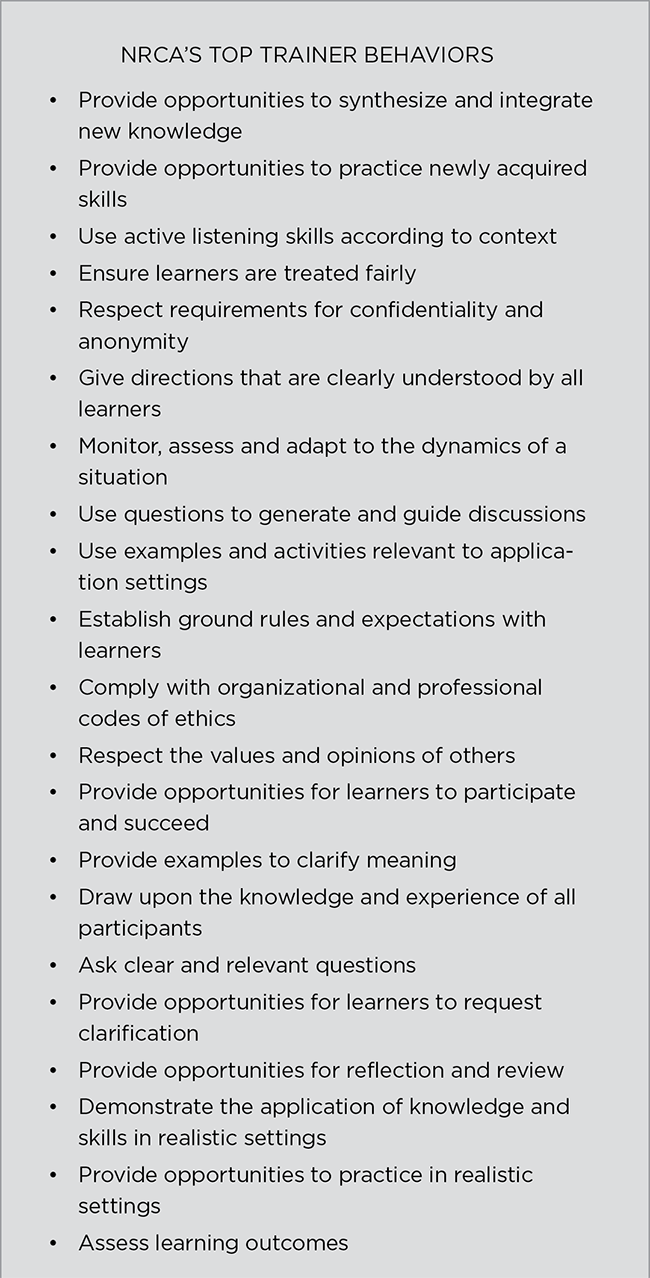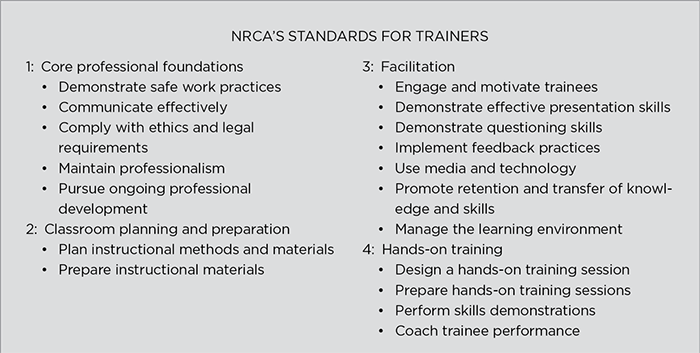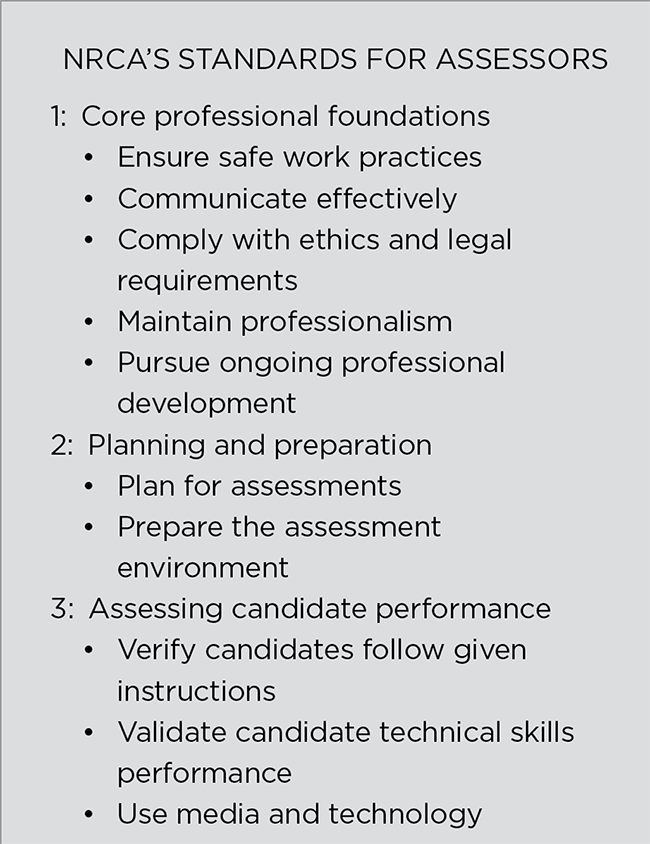The roofing industry—similar to other trades—is desperately in need of skilled workers. To address this issue, NRCA is launching a national worker certification initiative, the ProCertification program, later this year.
Trainers and assessors are crucial to developing skilled workers and accurately and fairly assessing workers' skills to certify their performances in specific roof, waterproofing and rooftop solar system disciplines. Training, assessing and professional certifications reinforce an organization's role as a leader in promoting competence, and NRCA is developing these to elevate the roofing industry's workforce.
Background
One factor contributing to the skilled workforce shortage is high schools are required to focus on theory rather than applied skills to maintain their funding and accreditation. One fallout from this has been the elimination of shop classes. According to Tara Tiger Brown, a program development educator, in a Forbes May 30, 2012, article, "The death of shop class and America's skilled workforce": "… [T]he skilled trades are undervalued in … the American educational system. But, the funny thing is that there is one place where they are actually not undervalued at all, and that is in the marketplace, which has seen a greater and greater demand for the skilled craftsman … the skilled tradesman has a choice of jobs, needs answer to no one, and earns a living wage, perks that are not to be scoffed at in this economic environment."
Businesses depend on a diversity of talents to fill jobs communities need. Communities require arborists, bookkeepers, carpenters, chefs, electricians, engineers, firefighters, mechanics, paramedics, plumbers, police officers, roofing contractors and professionals in many other occupations. However, according to author Ken Robinson in a May 8, 2015, Time magazine article, "Why schools need to bring back shop class," schools have been focused on testing a narrow set of academic standards, not building skills.
"There's a widening skills gap between what schools are teaching and what kinds of jobs are available and needed," he says. "There's plenty of work to be done, but too many people lack the skills to do it."
Although the public education system in the U.S. does not currently prioritize teaching work skills, other organizations, including NRCA, are filling the gap by preparing people for work in the current marketplace. Many offer opportunities for individuals to earn credentials such as certificates and certifications intended to differentiate them in the marketplace.
According to Georgetown University, Washington, D.C., industry-based certifications are the second most common postsecondary award in the U.S. More than one million certifications are awarded each year. Certifications are a viable way to build expertise, and they can give people and the firms that hire them a competitive edge.
Certifications are the new currency for career advancement. When Steven G. Hale worked as a multi-location facilities manager for Boeing Co., a large manufacturer of aerospace equipment and technology, he purchased more than $30 million worth of materials and services annually. When hiring and contracting workers, he looked for the word "certified."
"If a third party says you know your stuff, it increases the odds that you do know your stuff," he says. "When people in any industry make the effort to become certified, that says a lot to me about their commitment to their field."
Roofing industry credentials
There are two groups offering certifications in the roofing industry. The first group consists of companies such as distributors and manufacturers of roofing and waterproofing materials that are certifying their employees, customers, suppliers and after-market partners. The motive for companies is to protect their brand images, reduce the costs of sales and service, and mitigate the risk of misuse or damage. As people want to distinguish themselves in the marketplace, be more competitive, and have their expertise validated and recognized, companies certify their workforce and partners to build customer confidence and reduce costs associated with errors.
The second group consists of trade associations that want to help their members strengthen their workforces and work safely and to standard. It's no secret the roofing industry faces difficulty recruiting and retaining new workers. In response, NRCA is developing its ProCertification program—a series of standardized training programs and professional certifications—initially for roof, waterproofing and rooftop PV system installers and then for other personnel, such as foremen and service technicians.
The goals of NRCA's ProCertification program are three-fold: to address the workforce shortage by making the roofing industry more appealing through a standardized industry curriculum; create a career path for roofing industry field workers; and elevate the roofing industry to be on par with other trade professions with existing national standards.
The long-term vision of NRCA's ProCertification program is to develop a competent, sustainable and high-performing roofing and waterproofing industry workforce by providing individuals with a clear career trajectory that is based on a series of industry-specific educational and training courses and earned credentials. All educational and training opportunities are grounded in specific consensus-based learning objectives based on the knowledge and skills needed to complete roofing, waterproofing and rooftop solar installation projects safely and correctly.
Various standardized assessment tools are used throughout the program to confirm whether candidates have succeeded with achieving the required knowledge, skills and abilities for each credential. Assessments are designed to measure a candidate's foundational knowledge and his or her ability to perform each skill.
Training programs will be delivered online and benefit workers who are new to the industry or relatively inexperienced. Trainees can earn achievement awards by passing an online test about what they learned from the training and completing hands-on performance assignments. Certifications will be designed for experienced roofing workers and are earned by meeting specified experience and eligibility requirements, passing an online assessment and passing a hands-on, performance-based assessment. All training and certification components are being developed in English and Spanish. The opportunity for experienced installers to begin earning certifications is scheduled for fall 2018.
Certificates vs. certifications
Many organizations give a training certificate to anyone who completes an educational or training course, and numerous training companies, educational institutions and other types of companies offer "certifications." This has led to confusion about the different types of certificates and certifications.
An authentic professional certification is formal recognition by an established industry-specific organization that an individual has demonstrated a proficiency within a noncommercial standardized body of knowledge. The primary focus of a professional/personnel certification program is to provide an independent assessment of the knowledge, skills, and/or competencies required for competent performance of an occupational or professional role or specific work-related tasks and responsibilities, according to the Institute for Credentialing Excellence, a leading organization in setting quality standards for credentialing organizations.
The certification awarded designates participants have demonstrated the requisite work-related knowledge, skills and competencies and met other requirements established by the certification program provider. An authentic certification program does not require attending a particular educational institution or program. It is a mark of competence or readiness given by an independent third party to people who can demonstrate they can do the work to standard. Developing a certification is a complicated and time-consuming process requiring significant input from a diverse group of industry stakeholders and a strong organization that can support and sustain the resources needed.
Qualified trainers and assessors
Providing opportunities for people to demonstrate they have roof system installation and/or other skills to earn achievement awards and certifications is a critical aspect of NRCA's ProCertification program that will depend on developing a nationwide network of trainers and assessors for its success. It starts by educating experienced roofing industry professionals in best practices regarding planning and preparing for learning activities; facilitating learning in classrooms; demonstrating installation skills; coaching others who are practicing installation skills; and ensuring trainees' conformance with safety standards and accepted industry best practices to develop NRCA ProCertification Qualified Trainers.

Figure 1: NRCA's top trainer behaviors |
NRCA ProCertification Qualified Assessors are developed by learning to plan and prepare assessment activities; conducting accurate, fair and unbiased assessments of candidates' performances in specific roof system disciplines through observations; and ensuring candidates' conformance with safety standards and accepted industry best installation practices.
NRCA began the task of creating ProCertification Qualified Trainer and ProCertification Qualified Assessor educational programs by conducting a job task analysis (JTA) with a diverse group of experienced roofing industry trainers, including contractor-employed trainers, trainers from manufacturers of low- and steep-slope roofing products, and other technical and safety trainers. This formal study identified and verified what trainers do to help others gain skills when installing roof and waterproofing systems and what trainers must know about those systems to be effective when teaching adults.

Figure 2: NRCA's standards for trainers |
The study also identified methods for conducting an assessment (evaluation) of an installation assignment by ensuring the testing environment is appropriate and providing clear instructions to those being tested. The results of the JTA study then were converted into standards, training materials and assessments. Figure 1 lists NRCA's most highly rated behaviors required of an effective trainer.
Next, NRCA compared the results of its JTA with two international studies—one conducted by the Association of International Educators and another by the International Board of Standards for Training, Performance and Instruction. Collectively, the three studies identified the most important skills and behaviors unique to effective trainers and assessors in the roofing industry (see Figures 2 and 3).

Figure 3: NRCA's standards for assessors |
Content smarts
Effective trainers know their content. Charisma is not a substitute for knowledge and experience, and charm will not make up for ignorance or inexperience. The studies found being grounded in the subject being taught is essential because when trainers know the content, they can personalize it to provide real-life examples of why a job is done a certain way and what happens when it isn't.
Knowing the content is so important, NRCA's framework requires its trainers and assessors to be credentialed for the specific roof, waterproofing and rooftop solar systems they will train and evaluate others.
Presentation and demonstration
Presenting and demonstrating skills involve explaining, describing and giving details about why, what and how a task is done. Effective trainers can explain the what, why and how in words learners understand. Demonstrating is more than using words—it is showing the "how" while explaining the "why" behind each step. Presentation and demonstration can prepare the way for engagement.
Engagement
Being a good explainer is not enough. Effective trainers also engage their students. This means they ask questions that get learners to think and encourage them to participate in sharing tips about how to do a task right, faster and safer. They let students participate in the demonstrations and share what they have learned. They make time for participants to practice. They facilitate discussions about the what, why and how.
Organization and preparation
Organization and preparation are about being intentional about not wasting students' time. Effective trainers set up the training room and materials in advance. They decide what they want to talk about first, second and last. They check to be sure they have enough of the right materials, and they make sure equipment works before a session begins. They use their learners' time wisely.
Communicates assessment criteria
Assessors let candidates know in advance what behavior or work will be judged and how it will be judged. The assessor explains the rules in words understood by those being tested. They let them know when accuracy, time, safety, completion and so forth count and only judge based on the criteria communicated.
For NRCA programs, NRCA sets the criteria and determines the assessment rules such as how much time is allowed, what information and materials the candidates have access to when being assessed, and so forth. The assessor is expected to follow NRCA rules for conducting skills assessments.
Provides fair opportunity
Assessors give everyone an equitable opportunity to show what they know by providing the same testing conditions for everyone. For example, every individual being tested should have the same amount of time to demonstrate what he or she knows. The setups for each assessment session should be the same. NRCA provides assessors with details about how to conduct an assessment.
Preparing trainers and assesors
NRCA ProCertification Qualified Trainers will have participated in a multiday course during which they learn training best practices, focusing particularly on conducting hands-on demonstrations effectively and coaching inexperienced workers. The ProCertification Qualified Trainer course provides a supportive environment to learn from veteran roofing industry trainers, practice teaching others and to receive feedback.
This training expertise can be used to help others gain valuable skills that will lead to enhanced job satisfaction and pride in their work. It also can support the ProCertification workforce development program by helping students earn ProCertification achievement awards. ProCertification students who are newer to the roofing industry are required to complete roof system installation assignments to earn an achievement award. If a student does not have the chance to practice that skill on the job or at their workplace, a ProCertification Qualified Trainer can provide that opportunity.
ProCertification Qualified Assessors will play a different role in supporting NRCA ProCertification credentials. The ProCertification Qualified Assessor assessment-based certificate program teaches observation skills, and the policies and procedures required to evaluate the performance of roof system installers seeking NRCA ProCertification. Experienced roofing professionals learn these skills by completing online training and taking a proctored online exam that requires them to identify whether installation tasks have been done correctly.
Committed to excellence
Recognizing trainers is a major step in highlighting their importance for developing the next generation of roofing workers and elevating the current workforce. Individuals who can conduct accurate and fair assessments are important for performance-based certifications to be effective while reinforcing NRCA's role as a leader in promoting competence in roofing.
The process for developing NRCA's ProCertification Qualified Trainer and ProCertification Qualified Assessor programs not only follows best practices for creating credentials, but it also honors and builds on the work of other established organizations committed to promoting competence in training, education and workforce development.
The first NRCA ProCertification Qualified Trainer classes will take place the weeks of April 23 in Joliet, Ill., and May 14 in Orlando, Fla. Online ProCertification Qualified Assessor training will be offered beginning in the summer of 2018.
To learn more or to obtain copies of the standards, contact John Schehl, NRCA's vice president of certification and international engagement, at jschehl@nrca.net, or Brad Martz, manager of certification programs, at bmartz@nrca.net.
Judith Hale, Ph.D., is owner of Hale Associates, a performance improvement consulting firm located in Downers Grove, Ill.; Brad Martz is NRCA's manager of certification programs; and Jeanne Schehl, Ed.D., is an independent consultant located in Barrington, Ill.



